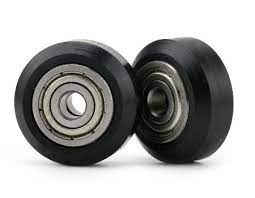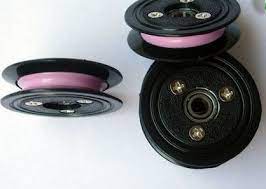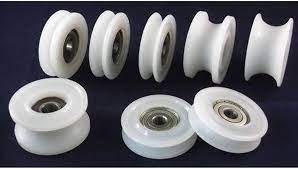Product Description
Product Description
| Products | Name | Customized Plastic Pulley with Beautiful Design |
| Products category |
Injection plastic parts | |
| Material | PP, ABS, PC, ABS/PC, Nylon, delrin(POM), PMMA, AS, PS, PE, PET, PVC, PEEK, etc GF added material (ABS+GF, PA66+GF, PA666+GF); Rubber like material (TPE, PU, NBR, silicone, NBR+TPE etc) |
|
| Size | All size and thickness available. | |
| Shape | capable of all shapes as per drawing | |
| Color | Natural,black,clear (standard clear or high optical clear), semi-transparent, other colors (Pantone code or RAL code, or as per client’s sample). |
|
| Surface finishing |
Texture (VDI/MT standard, or made to client’s sample), polished (high polish, mirror polish), smooth, painting, powder coating, printing, electroplating etc. |
|
| Drawing | 2D or 3D draiwng in any image/picture format is OK | |
| Free sample | Yes | |
| OEM/OEM | Yes | |
| Application | Household, electronics, vehicles, machinery, hospital, cosmetics, Military and Aerospace etc. |
|
| Quality certification |
IATF16949, FDA, REACH, ROHS, SGS | |
| QC | Every order production will get more than 10 times regular check and 5 fives times random check by our professional QC. Or by Third party appointed by customer |
|
| Mold | Molding Process |
Injection molding, overmolding. |
| Mould type | Injection plastic mould | |
| Standard | HASCO, DME, MISUMI, JIS, LKM, etc. | |
| Tooling equipment |
Lathe,Milling,Grinder,Drill,CNC,EDM,Wire cut machine,Punch machine | |
| Runner | Cold or hot | |
| Gate | Side Gate, Sub Gate, Direct Gate, Hook Gate, Pin Point Gate, etc. | |
| Cavity | Single or Multi cavities | |
| Mould Life | 300,000~1,00,000 times |
Product Show
ADVANTAGED SERVICE TO YOU
1. Lower freight of sample or goods by DHL, as we have DHL account with bigger discount
2. Lower price from less management cost, less labor cost and land cost from our new plant
3. Less FOB cost as it is only 2~3 hours drive from our factory to HangZhou or ZheJiang port
4. More solution for plastic/rubber material and prodution as our boss and engineers have 30 years of experiences in rubber plastic industry
5. More Effective service: prompt reply for your e-mail within 6 hours, good solution for any problems within 12 hours
6. More advantaged products: rubber molded/injection parts, plastic injection parts, and silicone extrusion parts
General introduction of HangZhou BRIGHT RUBBER PLASTIC:
HangZhou Bright Rubber Plastic Product Co.,Ltd represents high quality and is backed up by our team of quality assurance experts and our ISO 9001 and TS 16949 certifications. Its plant occupies over 2500 square CHINAMFG of land. Our strengths are our ability to respond quickly and efficiently to customer needs, excellent quality standards, and top notch follow-up service. Our reputation as a reliable and efficient supplier is based on these facts. Our strong engineering team supports our ability to provide excellent quality and on-time delivery.
Office
Our sale office is located in HangZhou city downtown, ZHangZhoug Province, China. It is in 2 hours drive distance to both our factory and airport or sea port in ZheJiang or HangZhou. It is also convenient to meet customers from different countries.
Products and materials
Our company is engaged in manufacture Rubber and plastic parts. The main products include CHINAMFG parts, Extrusion silicone tube/strip, silicone sponge tube, Injection plastic parts, Extrusion plastic parts, Rubber sponge parts, PVC dipping, The main rubber raw material is EPDM, Natural Rubber, SBR, Nitrile, Silicone, Fluorosilicone, Viton(FKM), Neoprene, Urethane(PU), Polyacrylate( ACM), Ethylene Acrylic(AEM), Santoprene, HNBR, Butyl(IIR), LSR; The main plastic raw material is PP, PA, PE, POM, PC, PVC, PS, PVC, TPE, TPR, TPU.
Profound experience
Our engineers and QC experts are engaged in rubber plastic industry over 30 years. Our core management team has rich experience and deep understanding of rubber and plastic development.
Production capacity
Factory is working 24 hours by 3 shifts every day, It takes only 3 minutes to finish 1 mold of products. (If 1 mold has 50 cavities, then we can produce 50PCS of products within 3 minutes).
Production machines including 350T vacuum pressing machine, 300T pressing machine, 250T machines and more others.
Quality control and test
It has more than 10 times of quality check for every order, beginning from raw material check to package check. Every production line has at least 2 QC staff for random check and regular check.
Test: manufactory testing machine includes rubber tension tester, rubber vulcanization instrument, durometer, calipers, ageing oven for Density test, Elongation at break, Bonding strength, Pulling force test, twisting force test, Rergarding other test like anti-high/low temperature which will be tested by Third Party Testing Center as customer required.
Sale service
Every salesman should be in service after strictly trained with productions knowledge and customer-service requirements. Be skilled in exporting business procedure and English communication.
FAQ
Q: Are you manufacturer or trading company?
A: We are manufacturer, engineer had rich experience over 20 years.
Q: How to get the quickest quotation?
A: Sending drawing, material, quantity and other rrequirements by email.
Q: How to get quotation without drawing?
A: Possible send sample, pictures or detail descriptions of products to us, we will return you drawing for confirm.
Q: I have an idea for a new product, but not sure if it can be manufactured. Can you help?A. Yes! We are always happy to work with potential customers to evaluate the technical feasibility of your idea or design and we can advise on materials, tooling and likely set-up costs.
Q: My custom products have already been developed on CAD. Can you use the drawings?
A. Yes! DWG, DXF, IGES, Solidworks and Rhino files can all be used to generate quotes, models and mould tools – this can save time and money in producing your parts.
Q: Can I test my idea/product before committing to mould tool manufacture?
A. Yes, we can use CAD drawings to make models for design and functional evaluations.
Q: What type of plastic/rubber material is best for my design/product?
A. Materials selection depends on the application of your design and the environment in which it will function. We will be happy to discuss the alternatives and suggest the best material.
Q: How to get sample?
A: Free sample is available for your quality evaluation, but you should pay the freight. Regarding customize products, sample and mould order will go first before mass production.
/* January 22, 2571 19:08:37 */!function(){function s(e,r){var a,o={};try{e&&e.split(“,”).forEach(function(e,t){e&&(a=e.match(/(.*?):(.*)$/))&&1
| Material: | ABS |
|---|---|
| Color: | According to Custom′s Request |
| Size: | as Drawing |
| Tensile Strength: | >=17MPa |
| Elongation at Break: | >=300% |
| Creep: | 15% |
| Customization: |
Available
| Customized Request |
|---|

What are some real-world examples of plastic pulley applications in different industries?
Plastic pulleys find a wide range of applications across various industries. Here are some real-world examples:
1. Fitness and Exercise Equipment:
In the fitness and exercise industry, plastic pulleys are commonly used in cable machines, functional trainers, and other resistance training equipment. They provide smooth and controlled movement of cables, enabling users to perform a variety of exercises targeting different muscle groups. Plastic pulleys contribute to the functionality and versatility of gym equipment, enhancing the overall workout experience.
2. Material Handling and Conveyor Systems:
Plastic pulleys are utilized in material handling and conveyor systems to facilitate the movement of goods, packages, or materials. They can be found in industries such as manufacturing, logistics, warehousing, and distribution centers. Plastic pulleys help guide and redirect conveyor belts, ensuring efficient and reliable transportation of products along the production or distribution line.
3. Automotive Industry:
The automotive industry employs plastic pulleys in various applications. They are commonly used in engine systems, such as timing belt systems, accessory belt drives, and serpentine belt systems. Plastic pulleys provide reliable power transmission and help drive auxiliary components, such as water pumps, alternators, air conditioning compressors, and power steering pumps. They contribute to efficient engine operation and overall vehicle performance.
4. Agricultural Machinery:
In the agricultural sector, plastic pulleys are utilized in machinery and equipment used for farming operations. They are often found in equipment such as combine harvesters, hay balers, crop sprayers, and seeders. Plastic pulleys help drive and control the movement of belts and chains, enabling the efficient operation of various agricultural processes and facilitating tasks like harvesting, baling, spraying, and seeding.
5. Industrial Automation:
Plastic pulleys play a role in industrial automation systems, especially in applications that require precise motion control. They can be found in robotics, CNC machines, printing machinery, packaging equipment, and other automated systems. Plastic pulleys provide accurate and smooth movement, contributing to the precision and reliability of these automated processes.
6. Medical Devices:
In the medical industry, plastic pulleys are used in various medical devices and equipment. They find application in devices such as surgical robots, rehabilitation equipment, patient lifts, and diagnostic machines. Plastic pulleys enable controlled movement and positioning in these medical devices, aiding in surgical procedures, patient mobility, and diagnostic imaging.
7. Textile Industry:
Plastic pulleys are employed in textile manufacturing processes. They are used in machinery for spinning, weaving, knitting, and other fabric production operations. Plastic pulleys help guide and tension the threads or yarns, ensuring smooth and consistent movement during the textile manufacturing process.
8. Entertainment Industry:
In the entertainment industry, plastic pulleys can be found in equipment used for stage rigging, lighting, and sound systems. They assist in the movement and suspension of stage elements, lighting fixtures, and audio equipment. Plastic pulleys provide reliable and smooth operation, facilitating the setup and operation of various events and performances.
These are just a few examples of how plastic pulleys are used in different industries. Their versatility, durability, and cost-effectiveness make them a popular choice for numerous applications where smooth and controlled movement is required.

How are plastic pulleys utilized in industrial machinery and conveyor systems?
Plastic pulleys play a crucial role in industrial machinery and conveyor systems. Here’s a detailed explanation of how plastic pulleys are utilized in these applications:
1. Belt and Chain Drives:
In industrial machinery and conveyor systems, plastic pulleys are extensively used in belt and chain drives. These pulleys serve as the guiding and tensioning components for belts and chains, facilitating the transfer of power and motion between different parts of the machinery or conveyor system. Plastic pulleys ensure proper alignment, tension, and engagement of the belts or chains, enabling smooth and efficient operation.
2. Material Selection:
Plastic pulleys are chosen for their specific material properties that make them suitable for industrial applications. Different types of plastics, such as nylon, polyethylene, or acetal (POM), are selected based on factors like strength, wear resistance, chemical resistance, and temperature tolerance. The material selection ensures that plastic pulleys can withstand the demanding operating conditions, loads, and forces encountered in industrial machinery and conveyor systems.
3. Wear and Friction Reduction:
Plastic pulleys are designed to minimize wear and friction in industrial machinery and conveyor systems. They often incorporate additives or fillers, such as reinforcing fibers or lubricants, to enhance their wear resistance and reduce friction. These features help prolong the lifespan of the pulleys and the belts or chains, improving the overall reliability and efficiency of the system. Plastic pulleys with low friction properties also contribute to energy savings and smoother operation.
4. Noise and Vibration Damping:
Plastic pulleys offer inherent noise and vibration damping properties, making them an ideal choice for industrial machinery and conveyor systems. The damping effect of plastic materials helps absorb vibrations generated during operation, reducing noise levels and minimizing the transmission of vibrations to other parts of the system. This results in quieter operation and improved working conditions for operators. Plastic pulleys contribute to overall system performance and enhance the user experience in industrial settings.
5. Corrosion Resistance:
Industrial machinery and conveyor systems may be exposed to harsh environments that involve moisture, chemicals, or corrosive substances. Plastic pulleys are resistant to corrosion, making them well-suited for such conditions. Unlike metal pulleys that can rust or corrode, plastic pulleys remain unaffected, ensuring reliable performance and reducing the need for frequent maintenance or replacements. The corrosion resistance of plastic pulleys contributes to the longevity and durability of industrial machinery and conveyor systems.
6. Design Flexibility:
Plastic pulleys offer design flexibility, allowing for customization and optimization in industrial machinery and conveyor systems. They can be molded into various shapes, sizes, and configurations to meet specific application requirements. Plastic pulleys can incorporate features such as flanges, grooves, or mounting options directly into the design, ensuring proper belt or chain engagement, alignment, and tension. This design flexibility allows for efficient integration and enhances the performance and reliability of industrial machinery and conveyor systems.
7. Cost-Effectiveness:
Plastic pulleys offer cost-effectiveness in industrial machinery and conveyor systems. They are generally more affordable compared to metal pulleys, resulting in lower production costs. Additionally, the lightweight nature of plastic pulleys contributes to reduced energy consumption and lower shipping costs. Plastic pulleys provide a balance between performance, durability, and affordability, making them a cost-effective choice for industrial applications that require multiple pulleys in machinery or conveyor systems.
In summary, plastic pulleys are extensively utilized in industrial machinery and conveyor systems for belt and chain drives. They are chosen for their specific material properties, including wear resistance, low friction, corrosion resistance, and design flexibility. Plastic pulleys contribute to smooth operation, reduced wear and friction, noise and vibration damping, corrosion resistance, design optimization, and cost-effectiveness in industrial applications.

What is a plastic pulley, and how does it compare to other types of pulleys?
A plastic pulley is a type of pulley made primarily from plastic materials, such as nylon, polyethylene, or polycarbonate. It is designed to perform similar functions as other types of pulleys but offers distinct advantages and considerations. Here’s a detailed comparison of plastic pulleys with other types of pulleys:
1. Material:
Plastic pulleys are specifically engineered to be lightweight and durable. They are resistant to corrosion, moisture, and many chemicals, making them suitable for various environments. In contrast, other types of pulleys, such as metal pulleys, may be heavier and prone to rust or corrosion without proper protection.
2. Cost:
Plastic pulleys tend to be more cost-effective compared to metal pulleys or pulleys made from other materials like ceramic or glass. The manufacturing process for plastic pulleys is generally less expensive, resulting in lower production costs and, consequently, lower prices for consumers.
3. Noise and Vibration:
Plastic pulleys often provide quieter operation compared to metal pulleys. The inherent damping properties of plastic materials help reduce noise and vibration during pulley rotation. This makes plastic pulleys suitable for applications where noise reduction is desired, such as in household appliances or office equipment.
4. Friction and Wear:
Plastic pulleys generally have lower friction coefficients compared to metal pulleys. This can result in reduced wear and tear on the pulley itself and the associated components, such as belts or ropes. However, it’s important to note that the selection of the appropriate plastic material and design considerations are crucial to ensure sufficient strength and wear resistance for the intended application.
5. Load-Bearing Capacity:
While plastic pulleys can handle moderate loads, they may have lower load-bearing capacities compared to metal pulleys. Metal pulleys, especially those made from robust materials like steel or cast iron, are typically stronger and capable of withstanding higher loads. Therefore, in heavy-duty applications or situations where significant forces are involved, metal pulleys may be preferred.
6. Temperature Resistance:
Plastic pulleys have varying temperature resistance depending on the specific material used. Some plastics can withstand a wide temperature range, while others may have limitations. For example, nylon can handle higher temperatures compared to polyethylene. In contrast, metal pulleys generally have higher temperature resistance, making them suitable for high-temperature environments.
7. Application Specificity:
The choice between plastic pulleys and other types of pulleys often depends on the specific application requirements. Plastic pulleys are commonly used in light to moderate load applications, such as in small appliances, office equipment, or recreational devices. Metal pulleys, on the other hand, are often preferred in heavy-duty applications, industrial machinery, or situations where high strength and durability are paramount.
8. Customization:
Plastic pulleys offer flexibility in terms of design and customization options. They can be easily molded into various shapes and sizes, allowing for specific features or geometries to be incorporated. This makes plastic pulleys suitable for applications where precise customization is required. Metal pulleys may require more extensive machining or manufacturing processes for customization.
In conclusion, plastic pulleys offer unique advantages such as lightweight construction, corrosion resistance, cost-effectiveness, noise reduction, and design flexibility. However, they may have limitations in terms of load-bearing capacity and temperature resistance compared to metal pulleys. The choice between plastic pulleys and other types of pulleys depends on factors such as application requirements, load conditions, environmental considerations, and budget constraints.


editor by CX
2024-04-24